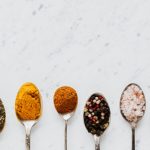This section will come with a zoom class on basic herbal preparations
Another form of plant medicine is the herbs and spices we use in everyday cooking. It is important to understand the importance of kitchen medicine and what you can use to help heal yourself through your food. Here is a list of some of our favorite herbs and spices we like to use in our food prep.
Turmeric– One of the greatest anti inflammatory foods on the planet. It comes from the root of a tropical bush and should be consumed daily in a tea or grated on top of your food to help reduce systemic inflammation daily
Garlic– This powerful anti microbial agent will help your body fight off infection from viruses, bacteria, and parasites.
Onion– Onions are also anti microbial and can help improve the bodies immune system
Basil– Is great for calming the stomach and relieving gas pains.
Sage– in tea or soup it can help relieve cramps, reduce fevers, treat nervous conditions and digestive disorders.
Parsley– is a potent diuretic for the kidneys and bladder, it is a general tonic for the body and has been used historically to treat jaundice, asthma, coughs, suppressed or difficult mensuration, obesity, bed wetting, rheumatism, tumors, edema, indigestion, worms, & kidney stones
Bay Leaf– rich in vitamin A, vitamin C, iron, potassium, calcium, and magnesium it makes a great overall tonic. It also helps treat migraines and indigestion.
Thyme– A strong antibacterial it helps treat colds, flus, sore throats, coughs, diarrhea, gastric infections, poor digestion and gas.
Rosemary– improves liver function, circulation, digestion and bile production. Topically the oil can sooth sore muscles, improve lymphatic circulation, and stimulate sweating.
Oregano– In a tea it can reduce headaches, improve digestion, treat colds & flu symptoms, colic and cough
Cinnamon– increases circulation, prevents colds & flu, slows bleeding and heals skin infections
Aloe– Topically it helps with a wide range of skin issues such as burns, sunburns, bug bites, cuts, bruises, eczema, psoriasis, fungal infections, and acne. Its good for sprains, strains and as a hair conditioner. Internally it can help treat digestive disorders including acidosis, heartburn, gastritis, ulcers, constipation, and colitis. It also can help with liver, gal bladder, kidney and bladder problems. It has also been shown to destroy cancer cells.
Citrus– all citrus is high in vitamin C and improves the function of the immune system. A tea can be made from the peels and can hep with upset stomachs and treating colds and flus.
Cilantro– The ground up seeds are good for treating upset stomachs, vomiting and diarrhea.
Coconut– Coconut meat are good for treating indigestion, diarrhea, gastritis, ulcers, hepatitis, and low energy. Coconut water is a diuretic and mixed with pineapple is good for the kidneys. Alone it can treat parasites, and improve the heart, circulatory system, liver function and digestion.
Mint– Aids in digestion, stops vomiting, helps with insomnia, calms the nerves, fights bacteria and prevents unwanted microbes from colonizing in the digestive tract. As a mouth wash it can help prevent cavities.
Ginger– A powerful tonic and cleanser ginger is great for treating colds, flus, sore throats, nausea, poor circulation, digestive disorders, kidney and bladder problems. Applied topically in an oil it is good for sore muscles, strains, sprains and arthritic disorders.





